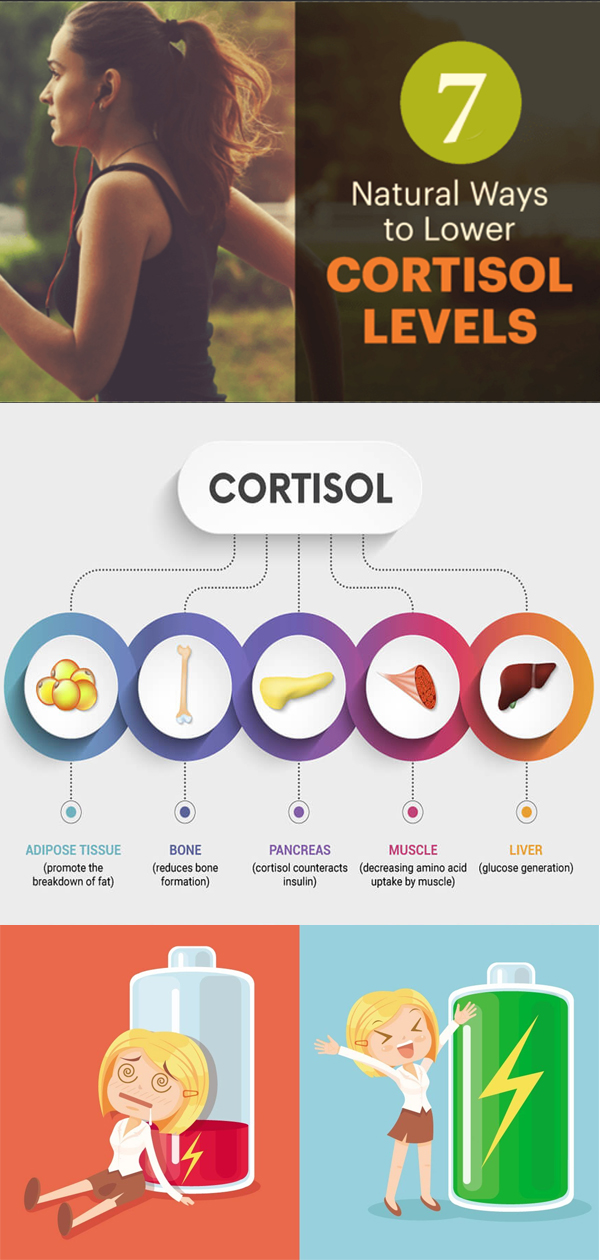The stress hormone, cortisol, is public health “enemy number one.” Scientists have known for years that elevated cortisol levels: interfere with learning and memory, lower immune function and bone density, increase weight gain, blood pressure, cholesterol, heart disease…The list goes on and on. – Psychology Today
Our bodies produce cortisol when stressed – a byproduct of innate, evolutionary programming that is designed to initiate action and elude danger. Cortisol, in addition to epinephrine, is an important stress hormone that serves a variety of functions. In fact, cortisol helps keep us alive by maintaining our body’s homeostasis (balance). It helps regulate blood pressure levels, metabolic activity, immune system responses, blood pressure, inflammation, heart functions, blood vessel function, and central nervous system activity.
However, elevated stress levels can cause our body to overproduce this hormone. When this happens, the body is prone to a number of undesirable side effects including: high blood pressure, weight gain, elevated cholesterol, heart disease, anxiety and depression, immune system damage, and cognitive problems such as difficulty learning and impaired memory.
That said, it is important that we keep our cortisol levels stable.
Here Are 7 Ways To Reduce Cortisol In The Body:
1. Get Some Exercise
Is there anything that physical activity won’t help? Seriously… there seems to be a new study every other day that links exercise to health benefits. Anyways, getting exercise can help reduce cortisol by “releasing” pent up stress or other counterproductive emotions.
One theory is that fear increases cortisol, and that by exercising we build upon our fortitude, resilience and self-confidence…effectively counteracting potential fear and reducing cortisol levels. Theories aside, exercise in any form is a great way to reduce cortisol levels.
2. Practice Mindfulness Or Meditation
Any kind of meditation or mindfulness practice can lower cortisol levels. Even a few deep breaths in the middle of a hectic workday can reduce our anxiety and stress, which also lowers the stress hormone.
A good, simple practice: when we start to feel stressed out in any way, take 10-15 deep breaths while feeling the body relax. Paying single-minded attention to our body and mind is called mindfulness – a practice that is incredibly beneficial to reducing a multitude of negative effects, both mental and physical. Of course, this reduces levels of cortisol.
3. Connect With Others
Researchers at Johns Hopkins University discovered a link between social isolation and increased levels of cortisol in mice. It is believed that those with a predisposition towards mental illness who are socially isolated in adolescence are more at-risk for the development of abnormal behavior later in life.
This study confirms what many scientists already knew: human bonding is important to physical and mental health at any age. Familial ties, friendships and intimate relationships are all beneficial to stress and thus reduces cortisol levels.
4. Laugh A Little
“Laughter is the best medicine.” How many times have we heard this throughout our lives? Dr. William Fry, a behavioral psychiatrist whose been studying the effects of laughter for over 30 years, states that laughter is inextricably linked to a number of physical and mental benefits.
One such benefit of laughter is its positive effect on stress hormone levels. Studies show that having a sense of humor, laughing and levity are all beneficial in reducing the levels of cortisol and other stress hormones.
5. Listen To Some Tunes
Pretty much all of us have experienced music’s mood-enhancing properties. There’s something about putting on a favorite tune and feeling much better for doing so. Turns out that there is a chemical reason for this: music increases the number of endorphins (“feel good” chemicals) and reduces the amount of stress hormones in the brain.
6. Eat Healthy
Certain foods such as eggs, fish, lean meat, flaxseed, citrus fruits, berries and leafy greens can help reduce cortisol levels. Another good idea for lowering stress and reducing cortisol is to incorporate five small meals a day. This helps to stave off hunger and reduce the common food cravings that result from high levels of cortisol.
Finally, implementing a high-fiber and high-protein diet will aid in reducing stress hormones. Reducing complex carbohydrates (i.e. sugar and starches) is another idea that helps in keeping cortisol levels at bay.
7. Get Enough Sleep
This one is relatively simple to explain. Not getting adequate sleep (7 to 9 hours a night) produces a systematically negative response from the body. We’re prone to cognitive impairment and are more reactive to the environment around us – both things are very bad for stress.
It is important to establish a sleep routine. Sleep experts recommend going to bed and waking up at the same time every day, including on weekends. It is also important to reserve the bedroom for sleep-related activities only. No tablets, cell phones, or laptops in other words.


